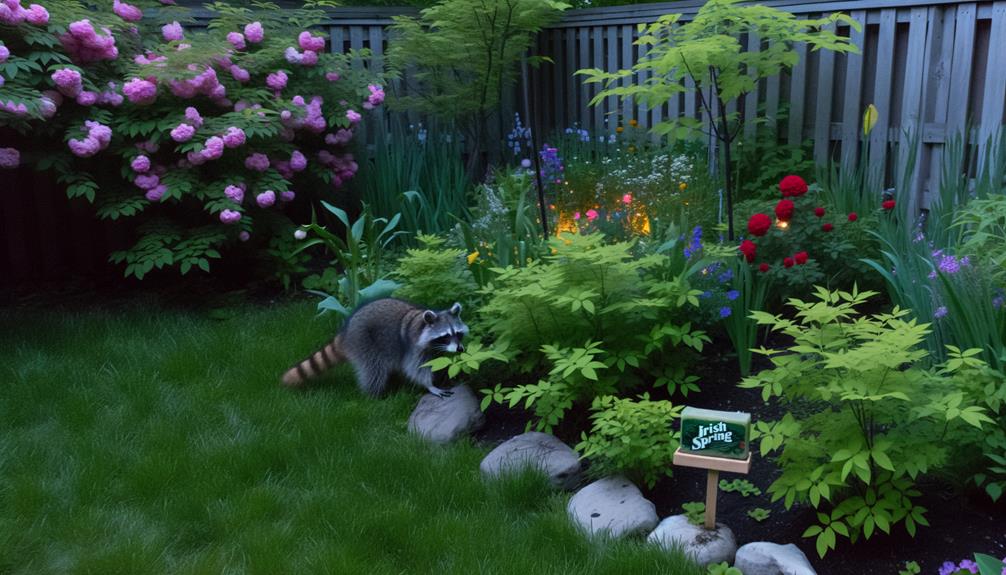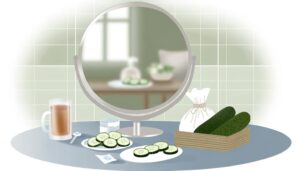Does Irish Spring Soap Keep Raccoons Away?
Irish Spring soap is noted for its potent fragrance, and many anecdotal accounts suggest it can effectively repel raccoons. The strong scent disrupts their foraging and nesting behaviors.
Despite this, scientific evidence supporting its efficacy is limited. As a non-toxic and affordable solution, placing bars of Irish Spring in strategic locations such as gardens, attics, or basements might deter these nocturnal creatures.
However, traditional methods such as securing trash bins and using physical barriers remain more reliable. For those seeking innovative deterrents, exploring further on this topic may yield practical insights.

Key Takeaways
- Irish Spring soap's potent fragrance can deter raccoons due to their acute sense of smell.
- Anecdotal accounts suggest that Irish Spring soap reduces raccoon activity when strategically placed.
- There is limited scientific evidence supporting the effectiveness of Irish Spring soap as a raccoon deterrent.
- Regular reapplication of Irish Spring soap is necessary to maintain its repellant effect.
- Irish Spring soap is a non-toxic, humane, and affordable method for raccoon deterrence.
Understanding Raccoon Behavior
To effectively deter raccoons, it is essential to first understand their behavioral patterns and ecological needs. Raccoons are nocturnal creatures, primarily active during nighttime hours.
Their omnivorous diet means they are opportunistic feeders, scavenging for food sources ranging from insects and small animals to fruits and human food waste. They possess remarkable dexterity, enabling them to open containers and access otherwise secure areas.
Raccoons are also highly adaptive, often inhabiting urban environments where food and shelter are readily available. Understanding these behaviors allows for the development of targeted deterrence strategies.
For instance, securing waste bins, removing potential food sources, and eliminating accessible entry points can greatly reduce raccoon activity, promoting a safer and cleaner community environment.
Scent-Based Repellents Explained
Employing scent-based repellents is a practical and effective strategy for deterring raccoons from residential areas. These repellents leverage raccoons' acute sense of smell to create an inhospitable environment, encouraging them to seek alternative locations.
Commonly used substances include ammonia, predator urine, and certain essential oils like peppermint and eucalyptus. When strategically placed near entry points, gardens, or trash areas, these scents can disrupt raccoons' foraging patterns and nesting behaviors.
For best results, regular reapplication is necessary, especially after rain or heavy dew. Scent-based repellents provide a non-toxic and humane solution, aligning with the values of those committed to ethical wildlife management and community well-being.
Understanding the efficacy and application nuances enhances their effectiveness in raccoon deterrence.
Why Irish Spring Soap?
Irish Spring soap has garnered attention as an unconventional yet effective raccoon deterrent due to its potent fragrance and ease of application. This soap's strong, lingering scent is thought to be highly offensive to the olfactory senses of raccoons, driving them away from areas where it is deployed.
Its solid form and widespread availability make it a practical solution for homeowners seeking an affordable and non-toxic method for pest control. By simply placing shavings or whole bars of Irish Spring in strategic locations such as gardens, attics, or basements, individuals can create an environment that raccoons find unappealing.
This method offers a humane alternative to traps or chemical repellents, aligning with the values of those committed to serving others and the environment.
Scientific Evidence
Despite anecdotal claims supporting the use of Irish Spring soap as a raccoon deterrent, empirical scientific studies validating its effectiveness remain limited.
Current research on raccoon behavior and deterrents primarily focuses on more conventional methods, such as physical barriers and chemical repellents.
The key active ingredient in Irish Spring soap, fragrance, lacks robust scientific backing to confirm its efficacy in repelling raccoons.
For those seeking practical solutions, it is advisable to rely on proven methods, such as securing trash bins and using motion-activated lights.
Future research could explore the potential of unconventional deterrents like Irish Spring soap, but until such studies are conducted, its effectiveness remains speculative within scientific contexts.
Anecdotal Accounts
Numerous individuals have reported success in using Irish Spring soap to deter raccoons, sharing their personal encounters and the practical steps they took.
Additionally, various neighborhoods have collectively adopted this method, narrating their experiences and observed outcomes.
These anecdotal accounts provide valuable insights, complementing scientific evidence with real-world applications.
Personal Encounters Shared
Many homeowners have reported personal success stories of using Irish Spring soap to effectively deter raccoons from their properties. Anecdotal evidence suggests that placing freshly cut bars of Irish Spring soap around gardens, attics, and garbage bins can create an olfactory barrier that raccoons find unappealing.
Users often strategically position the soap in areas with high raccoon activity, noting a marked decrease in visits. This practical solution leverages the strong scent of the soap, which appears to be a natural deterrent.
While these personal encounters provide hopeful insights, it's important to take into account that individual results may vary. For those seeking humane and chemical-free methods to protect their property, Irish Spring soap presents a potentially effective option worth exploring.
Neighborhood Experiences Narrated
Building on individual successes, several neighborhoods have collectively observed a significant reduction in raccoon activity after incorporating Irish Spring soap into their pest control strategies. These communities have implemented various practical measures, resulting in notable outcomes:
- Strategic Placement: Residents placed soap shavings in gardens and near trash bins, where raccoon activity was most prevalent.
- Consistent Application: Regularly replenishing soap shavings maintained the scent's potency and effectiveness over time.
- Community Coordination: Neighbors collaborated, sharing tips and coordinating efforts to maximize coverage and efficacy.
- Monitoring and Feedback: Continuous observation and sharing of results helped refine methods and confirmed the soap's effectiveness.
These collective actions underscore a proactive approach, demonstrating that simple, coordinated efforts can yield significant community benefits in pest management.
How to Use Irish Spring
To utilize Irish Spring soap effectively for deterring raccoons, begin by cutting the bars into smaller pieces to increase surface area and scent dispersion. Place these pieces strategically around areas frequented by raccoons, such as gardens, trash cans, and entry points.
For best results, consider placing the soap pieces in mesh bags or breathable containers to prevent them from being washed away by rain while allowing the scent to permeate the area. Regularly replace the soap pieces, as the fragrance diminishes over time.
This method leverages the strong scent of Irish Spring, which is believed to be unpleasant to raccoons, encouraging them to seek alternative locations. Implementing this strategy can provide a non-toxic and cost-effective raccoon deterrent solution.
Alternative Raccoon Deterrents
While Irish Spring soap serves as an effective raccoon deterrent, there are several other strategies that can be employed to keep these nocturnal pests at bay. Implementing a multifaceted approach can enhance the efficacy of raccoon control.
Here are some alternative methods:
- Motion-Activated Lights and Sprinklers: These devices startle raccoons, leveraging their natural aversion to sudden movements and water.
- Secure Trash Bins: Use raccoon-proof lids and store bins in a secure location to eliminate accessible food sources.
- Natural Predators: Introducing or mimicking the presence of natural raccoon predators, such as dogs, can create a hostile environment.
- Chemical Repellents: Sprays and granules formulated with ingredients raccoons find unpleasant can be applied around the perimeter of your property.
These tactics, combined with Irish Spring soap, can substantially reduce raccoon activity.
Conclusion
Drawing an analogy to the Sirens of myth, Irish Spring soap's effectiveness as a raccoon deterrent is more anecdotal than scientifically proven. While some claim its scent wards off these nocturnal marauders, empirical evidence remains limited.
Employing Irish Spring may offer a practical, budget-friendly solution, but reliance solely on this method is unwise. Exploring alternative deterrents alongside soap usage guarantees a more all-encompassing strategy for mitigating raccoon intrusions, thereby harmonizing folklore with practical application.






